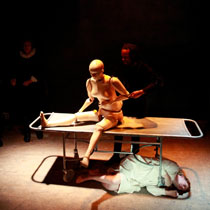
Commissioned by Renaissance scholar Stephen Greenblatt to create a work in hypothetical relation to the so-called ‘missing’ Shakespeare play, Cardenio, Jane Taylor first staged After Cardenio in 2011 at Hiddingh Campus’s historical Anatomy Lecture Theatre. In ‘After After Cardenio’, a lecture which brings together visual studies, performance studies, the history of medicine, the origins of neurology, and the history of philosophy, Taylor not only discusses the creative process behind this project, but also considers the volatility of creative engagement with archives.
After Cardenio’s playtext arose from a scholarly engagement with the story of a seventeenth-century woman, Anne Greene, hanged for infanticide, whose body was given over for an autopsy at Oxford University. Greene revived on the anatomy table, and Taylor’s research led her to explore the startling events in relation to the history of neurology and the intersection of Philosophy and Natural Science in the early days of Natural Philosophy at Oxford. In After Cardenio, Taylor explores the obsessions with the body/soul split, theorised by Descartes, who died the same year that Anne Green was hanged, using distinctive puppetry idioms (with a puppet created by sculptor Gavin Younge).
Tracing a link between the research of key seventeenth century thinkers, Taylor considers the significance of this episode on the thinking of John Locke, who became one of the great theorists of identity in the seventeenth century. Thomas Willis and William Petty were the anatomists involved in the ‘Anne Green episode’. Willis subsequently invented the term ‘neurology,’ and worked with Christopher Wren (who was to become the celebrated architect of St Paul’s) to produce the first modern illustrations of the human brain. Wren was a student at Oxford at the time of these events, and wrote a piece of poetry about the young woman who seemed to come back to life after death.
Jane Taylor is Visiting Professor at the University of Chicago and Mellon Research Advisor at the University of the Western Cape, and a member of the Board of Handspring Puppet Company. She is a published novelist and playwright, curator and cultural critic. Taylor has been a Visiting Fellow at Oxford and at Cambridge Universities in the UK; and has been recipient of Mellon and Rockefeller Fellowships. She has recently been appointed Wole Soyinka Chair of Theatre at University of Leeds.
Great Texts lectures will take place on Thursdays for the month of May. This lecture will take place on Thursday 9 May 2013 at 17:30 in the Anatomy Lecture Theatre, Old Medical School Building, University of Cape Town (UCT) Hiddingh Campus, Orange Street, Cape Town; and is free. Refreshments will be served from 17:00; no booking is necessary. For more information on the Great Texts series, please contact 021 480 7156 or fin-gipca@uct.ac.za.
Jane Taylor audio recording available for download.
Venue: Anatomy Lecture Theatre
Address: Google Map 31-37 Orange Street, Cape Town, 8001, South Africa
